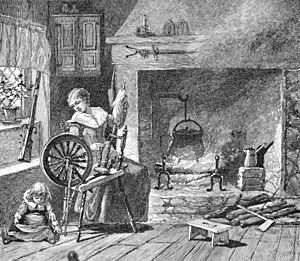Homespun movement facts for kids
The homespun movement began in 1767. It was started by a group called the Quakers in Boston, Massachusetts. The main idea was to encourage people to buy things made right there in the American Colonies. This was especially true for clothes. This movement started because of new British laws called the Townshend Acts in 1767 and 1768. These events happened just before the American Revolution began.
Contents
Why the Movement Started
Back in the 1600s, the Kingdom of England really wanted to protect its businesses. One of its biggest industries was making cloth and fabric. The British government did not want their colonies in America to make their own wool products. They expected Americans to buy all their fabric from England. In return, the colonies would send raw materials, like wool, to England.
British Laws on Textiles
However, the American colonies started to make more of their own wool products. To stop this, England passed a law called the Wool Act of 1699. This law made it illegal for the colonies to send wool, wool yarn, or wool cloth to other places.
This law made Americans want to find other ways to make their own fabrics. They started using plants like flax and hemp. From these, they could make home-spun fabrics, such as linen. This meant they didn't have to buy as much from England.
Homespun and the American Revolution
The word homespun soon became a way to describe any fabric made in America. This included cotton, linen, and wool. As more people decided to boycott British goods, wearing homespun clothes became a strong symbol. It showed that you supported the fight against British rule.
Women's Role in Homespun
Women played a very important part in the homespun movement. They chose not to buy expensive imported fabrics like satin and silk. Instead, they used materials made right in their own communities. They would spin yarn and weave cloth. Making homespun fabric often became a social event for women. They would gather together to spin and talk. This helped spread the idea of supporting American-made goods.
 | Janet Taylor Pickett |
 | Synthia Saint James |
 | Howardena Pindell |
 | Faith Ringgold |


